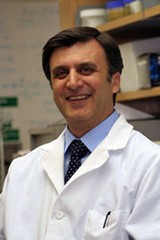Latest News
Research & Innovation
VCU Massey Cancer Center researchers overcome barrier to cancer immunotherapy
Sep 1, 2011

In lab studies, researchers at Virginia Commonwealth University Massey Cancer Center have effectively reprogrammed cells of the innate and adaptive immune system to overcome a key cancer defense mechanism and develop long-lasting memory to reject breast cancer cells and guard against tumor relapse.
Reported in the Journal of Immunology and led by Masoud Manjili, D.V.M., Ph.D., assistant professor of microbiology and immunology at VCU Massey, the study discovered a way to improve adoptive cellular therapy ACT for breast cancer. ACT is a way to boost the immune system’s ability to detect and destroy cancer through an infusion of T cells programmed to go after specific cancer markers. T cells are key elements of the adaptive immune system responsible for destroying invading pathogens. Nevertheless, the effectiveness of ACT is limited by myeloid derived suppressor cells MDSCs, which are cells spawned by cancerous inflammation that block T cells’ ability to attack tumor cells. Manjili and his research team discovered that ACT can overcome MDSCs by including natural killer T NKT cells in the therapy NKT cells express on their surface markers of T cells and NK cells, and they act as a bridge between the innate and adaptive immune systems.
The study was developed as a laboratory protocol to re-program NKT and T cells to increase resistance to MDSCs and overcome breast cancer cells in an animal model of breast carcinoma. The research also showed that radiation therapy altered immune system cells, causing ACT to fail, whereas immune cells harvested prior to radiation therapy resulted in a more potent ACT response.
“Cancer is so complicated that our immune system cannot destroy it unless we gain the ability to re-program and evolve immune responses,” says Manjili. “Also, when developing and using immunotherapies, we need to be aware of how other treatments such as radiation therapy affect the immune system’s ability to fight cancer.”
The process the researchers used to reprogram the immune cells was developed in collaboration with Harry Bear, M.D., Ph.D., Lawrence Chair of Surgical Oncology at VCU Massey. Bear had been working on a way to increase the effectiveness of tumor-reactive T cells for use in ACT before. Manjili modified the protocol to include NKT cells. Using animal models, they found they could program the T cells and NKT cells to develop a long-lasting memory for rejecting breast cancer cells, which may also prevent breast cancer recurrence. The key was the cells’ new-found ability to overcome MDSCs, which only occurred when NKT cells were combined with the T cells. They tested a similar protocol using blood from a breast cancer patient and found it expanded the T cells’ ability to react against the patient’s tumor-associated protein, HER-2/neu.
“The results of our study suggest that cells of the innate immune system, natural killer T cells in particular, should be included in adoptive T cell therapies,” says Manjili. “We’re very encouraged by our results and hope this approach will result in more effective adoptive cellular therapies against breast and other cancers, including melanoma, prostate and ovarian cancer.”
The researchers have obtained a grant from the Commonwealth Health Research Board to test this approach using peripheral blood obtained from breast cancer patients. They are optimistic the data from this future study will provide the rationale needed for the initiation of a Phase I/II clinical trial testing this new treatment in breast cancer patients.
In addition to Bear, Manjili also collaborated on this study with VCU and Massey researchers Maciej Kmieciak, Ph.D., Debasmita Basu, M.S., Kyle K. Payne, Amir Toor, M.D., Adly Yacoub, Ph.D., Xiang-Yang Wang, Ph.D., and Lisa Smith, R.N.
The study’s full manuscript is available online at:http://www.ncbi.nlm.nih.gov/pubmed/21670315.
Written by: John Wallace
Related News
Research & Innovation, Center News & Funding
Researchers awarded $7.3 million grant to launch groundbreaking breast cancer clinical trialAug 28, 2025
Research & Innovation
Vesalius cell-mapping tool provides insightful multi-layered view of cancer behaviorAug 25, 2025
Research & Innovation
A portable water tank could make radiation therapy more efficient and accessibleAug 14, 2025

Get access to new, innovative care
Treatments in clinical trials may be more effective or have fewer side effects than the treatments that are currently available. With more than 200 studies for multiple types of cancers and cancer prevention, Massey supports a wide array of clinical trials.

Find a provider
Massey supports hundreds of top cancer specialists serving the needs of our patients. Massey’s medical team provides a wealth of expertise in cancer diagnosis, treatment, prevention and symptom management.
